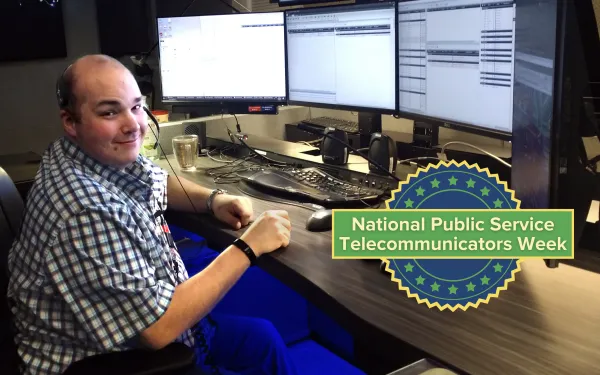On the Job: Brad Hardcastle, Telecommunicator

Read this interview with Hardcastle detailing the challenges and rewards of being a public service telecommunicator.
Tell us about your job at Metropolitan Computer Aided Dispatch (METCAD).
I’m a telecommunicator II at METCAD, a consolidated dispatch center. We cover non-emergency and 911 lines and police and fire dispatches for all the villages and cities in Champaign County—including police and fire agencies—and the university.
You never do the same thing two days in a row. If you’re taking non-emergency calls, you get dogs loose, noise complaints, COVID violations, routing people to the right place in city departments. On the emergency side, you have bar fights, car accidents, domestic violence, shootings. When you work dispatch, you have to prioritize what’s next for the limited officer resources. Sometimes the callers have to wait a long time for help and you have to use your skills to calm that person down over the phone until an officer can get there. If you’re a police dispatcher, you want all your officers to go home at the end of the night.
How does your job provide a valuable public service?
We’re the first responders. We let police, fire and EMTs know about the emergency and do our best to help until they can get there.
We’re the ultimate problem solvers. A lot of times people call 911 because they don’t know what to do. So we figure out what they need and where to refer them to. We might be able to handle the issue over the phone by referring them to a homeless shelter or social service agency to help them out and not tie up a police officer.
Our local union and the city of Champaign have a really good relationship. Right now we’re in a staffing shortage and we’ve had labor-management meetings to help find solutions. Our relationship lends to a collaborative working environment and that helps all around. Morale is taking a hit with the staff shortage, but we don’t ignore the problem. We’re working on making it better.
What’s your inspiration to go to work every day?
You never know what’s on the other end of that line. It could be that someone is having a heart attack and you have to help a family member do CPR. The next day you’re helping to deliver a baby. That’s what I like about it.
Last year was the first baby I had born over the phone. Most of the time the fire department can get there, but this call was from a rural area with a volunteer fire department and they couldn’t get there in time. So I helped deliver the baby. It was awesome to hear that cry over the phone.
What have you learned from your job?
We’re all emergency medical dispatch certified, which means we’re trained to deal with 33 protocols from allergic reactions to heart attacks, child birth to lightning strikes, burns to cold exposure. I’ve had a couple CPR saves, a baby who stopped breathing that we got breathing again—who turned out to be a police officer’s baby. There have been a couple critical incidents, big shootings, where I was in charge of the room and as a team, we got through it. It was good to be part of a team to work through those incidents together.
I train new staff. One of the first things I tell them is that you can’t take anything home with you. It’s not good for your mental health or for your family. Make sure you have a hobby, playing baseball, building model trains. You need that outlet and stress reliever or else it’s going to eat you up. But the good definitely outweighs the bad.
How does having a union job impact your life?
I have a pension, good pay. I’m in for the long haul. I bought a house about five years ago. Being able to negotiate good terms makes for a better life. Especially right now, during COVID, or back in the 2008 recession, we were able to maintain our pay and benefits through it all. I’m getting married in October. My fiancé and I are both involved in civic organizations. Because of my good union job, I don’t have to work two jobs. I can put my time and effort into that important work too.
